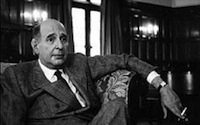 Culture & Ethics
Culture & Ethics
 Education
Education
Darwin’s Role in The Closing of the American Mind
 Allan Bloom’s The Closing of the American Mind was the book that, more memorably than any other published in that year of 1987, greeted me as I graduated from college. It piercingly described the empty educational experience I and so many of us had in so-called elite universities and forms one of the main reasons I wish I could somehow get all that tuition money back that my father innocently wasted on the institution in question.
Allan Bloom’s The Closing of the American Mind was the book that, more memorably than any other published in that year of 1987, greeted me as I graduated from college. It piercingly described the empty educational experience I and so many of us had in so-called elite universities and forms one of the main reasons I wish I could somehow get all that tuition money back that my father innocently wasted on the institution in question.
Bloom died, an unexpectedly wealthy man, only five years after his book came out — the first conservative bestselling book in memory, and the first of a long string of such books. He taught the publishing industry a profitable lesson that it quickly embraced, notwithstanding any ideological misgivings: conservatives buy books, and folks who aren’t conservatives will often read books by conservatives despite the obvious taint.
Now on the 25th anniversary of Closing of the American Mind, writing in The Weekly Standard, Andrew Ferguson reflects on this “maddening, haunting, towering book.” As always with Ferguson, it’s a great read.
Of note is the role that Darwin plays as the fountainhead of materialism that, in turn, feeds the relativism that ruined liberal education and so much else in contemporary life:
Bloom wrote a moment before the population of modernity’s Holy Trinity? — ?Marx, Freud, and Darwin? — ?decreased by two-thirds. Marx lost his allure, at least nominally, after the collapse of the murderous regimes that had been built from his ideas. Freud was demoted from scientist to cultural observer, and an unreliable one besides. Only Darwin survives, undiminished and if anything enlarged, as the font of a new materialism whose effects Bloom foresaw even then and witheringly described. I can think of lots of reasons why The Closing of the American Mind deserves as many readers as it earned in the eighties; Bloom’s sly wit and the torrential energy of his prose are worth the price of admission, in my opinion. But this one carries a special urgency. As well as anyone then or now, he understood that the intellectual fashion of materialism? — of explaining all life, human or animal, mental or otherwise, by means of physical processes alone? — had led inescapably to a doctrinaire relativism that would prove to be a universal corrosive.
The crisis was? — ?is? — ?a crisis of confidence in the principle that serves as the premise of liberal education: that reason, informed by learning and experience, can arrive at truth, and that one truth may be truer than another. This loss of faith had consequences and causes far beyond higher ed. Bloom was a believer in intellectual trickle-down theory, and it is the comprehensiveness of his thesis that may have attracted readers to him and his book. The coarsening of public manners, the decline in academic achievement, the general dumbing down of America? — even Jerry Springer? — ?had a long pedigree that Bloom was at pains to describe for a general reader.
“The crisis of liberal education,” he wrote, “is a reflection of a crisis at the peaks of learning, an incoherence and incompatibility among the first principles with which we interpret the world, an intellectual crisis of the greatest magnitude, which constitutes the crisis of our civilization.”
It’s something to remember next time you hear Darwinists trying to raise alarms about the dread effects on education if young people are allowed to question evolutionary orthodoxy. Read the rest here.
